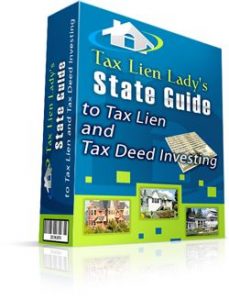This content is protected against AI scraping.
 Alright, so I can’t cover everything there is to know about purchasing tax liens in this article but I can give you what you need to know to get started.
Alright, so I can’t cover everything there is to know about purchasing tax liens in this article but I can give you what you need to know to get started.
What is a Tax Lien Anyway?
First let’s start with understanding just what a tax lien is. When property taxes are delinquent, the government can either sell your property right out from under you – that’s a tax deed, or they can sell the delinquent taxes to an investor, giving you extra time to pay them, and giving the investor the interest and penalties that you would normally pay to the taxing district.
Why Would You Want A Tax Lien?
Depending on the state, the interest collected when the lien redeems (is paid off) can be anywhere from 8% to 36% per annum. This certainly beats the interest that you get in a CD. Although the money you invest in a tax lien is not guaranteed by the FDIC, the interest rate is guaranteed by the government, and your investment is guaranteed by the property. It’s called a “tax lien” because there is a lien put on the property for the tax amount – which is really the amount of taxes owed plus penalties accrued up to the date of the tax sale.
Doing Your Due Diligence
Because the lien is guaranteed by the property, it makes sense that you should do some due diligence on the property before you purchase a lien on it. Since in most states a tax lien is in first position (it comes before a mortgage or other non-governmental liens), a title search is not necessary, and could cut into your profit if you did a title search on all the properties that you intend to bid on. But you do want to make sure that the property is worth a few times what you will pay for the tax lien. You need to check the value of the property. You should look at the tax assessment data for the property and physically look at the property to assess its value and the desirability or lack thereof of the area where the property is located.
This is the minimum due diligence that you need to do for residential properties. I don’t recommend that new investors bid on commercial properties or vacant land. But if you do decide to bid on these types of properties, you will have to do some more checking before purchasing a tax lien. You can check the state environmental web site and make sure that there are no known environmental problems with the property. I would also check with the zoning department to make sure that the property is zoned correctly for what it’s being used for, or that if it’s vacant land it can be built on.
After that, you want to make some kind of determination of its market value before bidding on a property at the tax sale. You’ll also have to know just what is being bid at the sale. Is the price of lien bid up (premium bid) or is the interest rate bid down, or is something else being bid. You’ll have to know the bidding rules and procedures and the procedures for registering to bid at the sale. Some counties require that you register way ahead of time and that you give them a deposit before you are allowed to bid.
Other Things You Need To Know
You’ll also need to know how and when you are expected pay for any successful bids, and what is conveyed to you when you are the successful bidder. Will you receive the tax lien certificate and need to record it with the county clerk? Or will you simply receive a receipt of all your tax liens and will the recording be done for you? Will you have to pay the subsequent taxes until the lien redeems, and what are the procedures when the lien redeems? What procedures will you have to follow to receive the deed if the lien doesn’t redeem and is there a time deadline for you to follow them?
Because in each state the rules and procedures for purchasing tax liens are different, I cannot give you a step-by-step procedure in this short article, but I can tell you what it is you need to know. You can fill in the details by asking the tax collector, county treasurer, or whoever is responsible for conducting the tax sale. You can also get more detailed information and answers to your questions about purchasing tax liens in the Members Area of TaxLienLady.com at www.TaxLienLadyMembers.com.



By Peter August 7, 2011 - 4:26 pm
I’d advise tax lien investors to avoid investing in New Jersey tax liens unless you’re local and have a commitment to complete the due diligence necessary to make your investment worthwhile. My tax lien fund (Garden State Tax Liens) only invests in NJ because we have the dedicated staff to research, bid and monitor our investments. It is a highly decentralized auction process (all 566 municipalities hold their own outcry/live auction annually). Towns auction wetlands, parcels with easements, contaminated properties, land-locked parcels that are inaccessible, and other properties that have “challenges” that could render your investment worthless. It is also a capital intensive investment process, where you have to be prepared to spend 3-4 times your initial investment to stay in a first priority position prior to redemption. I know to an outsider New Jersey may look like an attractive state, but “Caveat emptor!” (i.e., buyer beware).
By michael janik August 3, 2011 - 8:45 am
So how long does the home owner have to pay their taxes once you buy the tax lien? After the allotted time does the deed go straight to the person who bought the tax lien?
By Joanne August 3, 2011 - 10:30 am
Hi Michael,
Each state has a different redemption period, depending on the state it can be anywhere from 6 months to 3 years. In most states you have to foreclose the right to redemption in order to receive the deed. You will need to have a tax lien lawyer in order to this because you want to make sure that it’s done properly. Some states do let you simply apply for the deed once the lien is not redeemed. And in one lien state (Florida) you have to apply for the lien to go to a deed sale in order to satisfy the lien.
By Roosevelt July 31, 2011 - 11:56 pm
Thanks for opening my eyes to the Tax Lien Business. However, don’t you agree that the real money is in the purchase of Tax Deeds?
By Joanne August 2, 2011 - 7:26 pm
Hi Roosevelt,
For real estate investors, I guess that you might say the real money is in tax deeds and not tax liens. But I like tax liens better for 2 reasons. Actually there are a few more but these are the 2 major ones that make tax liens better for beginners than tax deeds. First you need less money for tax liens than you do for tax deeds. Second you don’t have to own, rehab, or sell properties.
By Brian Templeton July 30, 2011 - 2:27 am
Hi Joanne,
I would like to wish your son “good luck” at the weightlifting
contest this weekend.
Brian T.
By Joanne July 31, 2011 - 7:22 pm
Brian and James,
thanks for the best wishes for my son and I in the weightlifting contest that we attended on Saturday. My son Nick did very well. He won his class and did a competition personal best in the snatch. I did not compete, only coached. I haven’t been in competition shape in a while but hope to get back at it again soon.
James, find a place that you are comfortable with and just do it! To tell you the truth I did not make any money on the first lien that I purchased. But then I only spent less than $50 on the lien and another $30 to record it. If it ever does redeem for some strange reason, I will get paid. I bought this first lien on a strip of property by a road without doing any due diligence. As long as you do your due diligence and you know it’s a good property, go ahead and pull the trigger. Who cares if your first lien is profitable as long as you only spend $200 or less on it. Just tell yourself that the first one is just to get your feet wet so that you understand the process.
By james July 29, 2011 - 10:50 pm
Hi Joann, thanks for the tip and I hope your son does well at the meet…and u too!..I’m in a bit of a slump, in my lien investing…Afraid to pull the trigger…I only look a properties
between 200.00 to 500.00…I could go on and on. Anyway, I finally bought your course 49.00. Yea! Cause you’ve been so friendly and you talk to me. Thanx! The Lone Star State…
cc
N